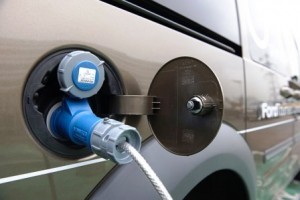Since batteries for electric vehicles can cost as much as the car itself, and much more for larger ones, automakers are asking for huge taxpayer subsidies to aid EV sales.
The United Kingdom is the latest government to propose EV financial assistance.
In an historic announcement for the island nation, Chancellor Alastair Darling in his pre-budget report proposed that consumer incentives worth £2,000 to £5,000 ($8,100) would be available starting in 2011 to reduce the purchase price of electric and plug-in hybrid vehicles.
Substantial assistance for businesses buying EVs is also part of the budget; and it appears that the UK is the first government to do so.
“To help boost the number of electric cars on our streets, I have decided to exempt them from company car tax for 5 years. And I can also announce a 100% first year capital allowance for electric vans,” Darling said.
The latest announcement follows a £30 million “Plugged in Places” program launched last month to support the development of charging infrastructure in several UK cities.
The European Union is moving ahead — over automakers’ protests — with new CO2 standards for passenger cars that dictate a reduction in average CO2 emissions from new cars to 120 g/km. Fewer than 9% of the cars sold in the EU in 2006 met this level of emissions. The costs of are estimated at about €3,600 ($5,108) on average per car.
While there is an implementation phase-in for the new EU regulation — it still appears on the surface extremely ambitious without market intervention. Starting in 2012 65% of new cars sold will comply; 75% in 2013; 80% in 2014 and 100% in 2015. Electric vehicles and hybrids, depending on how they are measured, can more easily comply with the standards and supply credits, which will allow the sale of conventional vehicles.
However, every study that I am aware of shows that consumer expectations are wildly discordant with the performance and the price of upcoming electric vehicles. So just how much EVs can contribute to CO2 reduction remains dependent on how many actually are put in use. Here, the push for “incentives,” read taxpayer subsidies, continues not only from automakers but environmentalists and other pressure groups as well.
Frost & Sullivan’s recent Voice of the Consumer surveys show that 80% of European consumers say government EV incentives are important to them and more than 65% of businesses in the UK, France and Germany say they would not consider purchasing EVs without incentives. Of course Frost is frequenly retained by the automakers and has an extensive EV consultancy going, but that doesn’t mean data show consumer reluctance is invalid.
The largest maker of automotive batteries in the world also agrees, not without self interest, that without subsidies, the batteries used in EVs and hybrids will not allow for commercialization on a large scale. In an analyst presentation this fall, MaryAnn Wright of Johnson Controls said that a positive economic equation is not possible without subsidies of at least $7,500.
“We can achieve — with subsidies — a total cost of ownership that is competitive with internal combustion engines,” Wright said. She was using a three-year analysis of a vehicle, which included an above average retention residual value.
The analysis is significant in my view since Johnson Controls launched the industry’s first mass production lithium-ion battery plant in France, and is a leader in battery technology.
In the UK, Frost & Sullivan believes that the business delivery services, postal and courier, utility and telecoms industries will be the first to take advantage of the incentives, which makes sense. Companies such as Tesco and EDF have already tested EVs in their fleet. Royal Mail is buying 15 Ford Transit electric vans in 2010.
The business subsidies will certainly help businesses. As to the overall size of the EV market, we will have to wait and see.

